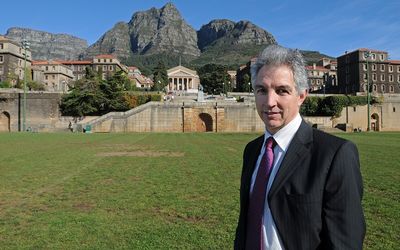THE University of Cape Town (UCT) has not ruled out retrenchments as it moves to implement strict austerity measures.
The university needs to save R120m by 2018 "to avoid entering a serious deficit budget scenario", said UCT vice-chancellor Max Price, who revealed the plans this week. The "austerity measures will be implemented between now and 2018", he said.
Mr Price said that as most of the institution’s R2.6bn annual budget went towards staffing, 80% of savings "need to be made on the staffing bill".
"We will, wherever possible, rely on natural attrition — retirements, resignations or incentivised retirements, and stopping of non-essential activities.
"This might not always be possible, and where it becomes necessary to restructure to achieve efficiency and meaningful savings, we will follow due human resources process in consultation with the unions," Mr Price said.
Universities have been hit by a shortage of funding, worsened by the government’s decision to freeze fee increases for this year, following widespread student protests.
Mr Price said that low government subsidies were a major problem, as subsidies increased at only 3.5% per year.
This was 2.5 percentage points behind inflation and four percentage points behind UCT’s cost increases, which "was largely due to our growing salary budget that amounted to a 20% smaller budget over five years".
"In the past, we compensated for some of this decline through fee increases that were well above inflation. But there remained an annual shortfall, and with fees in the future unlikely to increase at the rates they did in the past, this deficit will grow if we do not tackle it now," he said.
Mr Price said while Finance Minister Pravin Gordhan’s budget commitments compensate for shortfalls in the National Student Financial Aid Scheme (NSFAS) and for the 0% fee increase, they do not indicate a growth in subsidy that would keep up with growing student numbers and with inflation.
"Given the general economic and fiscal performance of our economy, it would be irresponsible in terms of the future sustainability of UCT simply to carry on at our current spending level in the hope that government funding will come to the rescue in the next three years."
In his budget speech last month, Mr Gordhan said that an additional R16.3bn would be allocated for higher education over the next three years. Of this, R5.7bn would tackle the shortfall caused by the moratorium on fee increases and the carry-through costs of this for the next three years.
NSFAS would get R2.5bn to clear outstanding student debt, along with a further R8bn in the medium term.
Stellenbosch University has ruled out staff reductions.
"Stellenbosch University went through a cost-cutting exercise of R62m in 2013 from ad hoc and vacancy positions to address a R32m budget deficit for 2014 and to utilise the remaining R30m for new academic positions in faculties with high student-to-staff ratios. Therefore, we are not planning for staff reductions currently," said university spokesman Martin Viljoen.

Max Price. Picture: HETTY ZANTMAN
THE University of Cape Town (UCT) has not ruled out retrenchments as it moves to implement strict austerity measures.
The university needs to save R120m by 2018 "to avoid entering a serious deficit budget scenario", said UCT vice-chancellor Max Price, who revealed the plans this week. The "austerity measures will be implemented between now and 2018", he said.
Mr Price said that as most of the institution’s R2.6bn annual budget went towards staffing, 80% of savings "need to be made on the staffing bill".
"We will, wherever possible, rely on natural attrition — retirements, resignations or incentivised retirements, and stopping of non-essential activities.
"This might not always be possible, and where it becomes necessary to restructure to achieve efficiency and meaningful savings, we will follow due human resources process in consultation with the unions," Mr Price said.
Universities have been hit by a shortage of funding, worsened by the government’s decision to freeze fee increases for this year, following widespread student protests.
Mr Price said that low government subsidies were a major problem, as subsidies increased at only 3.5% per year.
This was 2.5 percentage points behind inflation and four percentage points behind UCT’s cost increases, which "was largely due to our growing salary budget that amounted to a 20% smaller budget over five years".
"In the past, we compensated for some of this decline through fee increases that were well above inflation. But there remained an annual shortfall, and with fees in the future unlikely to increase at the rates they did in the past, this deficit will grow if we do not tackle it now," he said.
Mr Price said while Finance Minister Pravin Gordhan’s budget commitments compensate for shortfalls in the National Student Financial Aid Scheme (NSFAS) and for the 0% fee increase, they do not indicate a growth in subsidy that would keep up with growing student numbers and with inflation.
"Given the general economic and fiscal performance of our economy, it would be irresponsible in terms of the future sustainability of UCT simply to carry on at our current spending level in the hope that government funding will come to the rescue in the next three years."
In his budget speech last month, Mr Gordhan said that an additional R16.3bn would be allocated for higher education over the next three years. Of this, R5.7bn would tackle the shortfall caused by the moratorium on fee increases and the carry-through costs of this for the next three years.
NSFAS would get R2.5bn to clear outstanding student debt, along with a further R8bn in the medium term.
Stellenbosch University has ruled out staff reductions.
"Stellenbosch University went through a cost-cutting exercise of R62m in 2013 from ad hoc and vacancy positions to address a R32m budget deficit for 2014 and to utilise the remaining R30m for new academic positions in faculties with high student-to-staff ratios. Therefore, we are not planning for staff reductions currently," said university spokesman Martin Viljoen.




















Change: 0.26%
Change: 0.41%
Change: 0.74%
Change: 0.41%
Change: -0.46%
Data supplied by Profile Data
Change: -0.01%
Change: 0.90%
Change: 0.26%
Change: 0.00%
Change: 0.66%
Data supplied by Profile Data
Change: 0.82%
Change: 0.68%
Change: 0.64%
Change: 1.03%
Change: 0.82%
Data supplied by Profile Data
Change: 0.17%
Change: -0.31%
Change: 0.94%
Change: 0.17%
Change: -0.05%
Data supplied by Profile Data